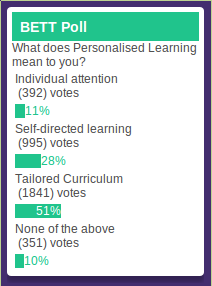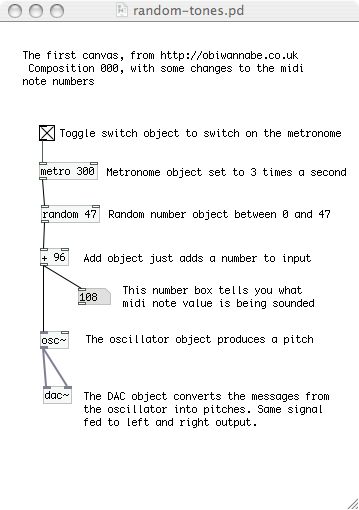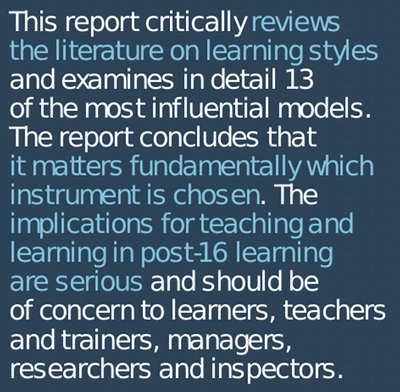January 5th, 2009

- Individual attention?
- Self-directed learning?
- Tailored Curriculum?
- None of the above?
The BETT 2009 homepage has a poll on the right hand side of the page. After some deliberation, I went for ‘tailored curriculum’ and found myself in the majority (a fairly unusual position for me). I was dithering over ‘none of the above’ for some 30 seconds or so however.
I’m thinking more of Vygotsky and his Zone of Proximal Development and the student having someone [ or a system? ] that knows them, their cognitive style and how to challenge them just enough so as not to overload or bore.
Posted in ILT | Comments Off
January 3rd, 2009

“In the most basic way, writers are defined not by the stories they tell, or their politics, or their gender, or their race, but by the words they use. Writing begins with language, and it is in that initial choosing, as one sifts through the wayward lushness of our wonderful mongrel English, that choice of vocabulary and grammar and tone, the selection on the palette, that determines who’s sitting at that desk. Language creates the writer’s attitude toward the particular story he’s decided to tell. But more than that, language is a part of the creation of the characters in the story, in the setting and in the sense of movement.” Donald Westlake
Posted in Notes | Comments Off
December 29th, 2008

Pure Data is an Open Source programming environment for making music that has an interesting graphical interface. It runs fine on my old iBook under Mac OS and there is a slightly older version in the Ubuntu repositories for Ubuntu 8.10 that runs very fast on my Asus Pundit box using the ALSA sound interface.
I think the programming metaphor will also go down well with younger people – drag boxes and define objects, and then connect the boxes together and the sound signal flows from top to bottom. Miller Puckette based the open source Pure Data on a previous commercial project (MAS), and provides online access to his book, The Theory and Technique of Electronic Music.
I found out about Pure Data from David Toop’s Haunted Weather, a copy of which was in my Christmas stocking this year [ thanks Joan! ].
Posted in ILT | Comments Off
December 21st, 2008

I’ve been using Ubuntu on a variety of desktop and old laptop computers for the last few years at home. Less virus hassle, no big issues converting documents between platforms since OpenOffice became available, and the ‘desktop experience’ is getting better all the time.
I installed version 8.10 this morning on this Asus Pundit P1 box complete with the dreaded NVIDIA integrated graphics and the whole process took about one hour. Video ‘card’ recognised and a choice of NVIDIA drivers offered. I installed the recommended one, and switched on the graphic effects. I now have bouncing windows and genie like minimisation without too much flicker on the no name 1280 by 1024 monitor.
The flash plug in installed from within Firefox when I went to a Web page that used a flash animation. I installed Java 6 from the Synaptic Package Manager, and found that I need to do restart Ubuntu, not just the Web browser, to ensure that Firefox could find the Java run time engine. I’m not sure why a restart is needed. Before I worked out what was going on, navigating to a page with an embedded Java applet provoked the “Plugin Missing” pop up in Firefox. When clicking on Install Plugin, Firefox then told me that the plug in was already installed… Loops like this confuse people. I also installed the wonderful Liberation font family using Synaptic so that my Open Office documents will open without any changes on Windows or the iBook.
Ubuntu 8.10 required a total of 203 updates (around 220 Mb worth) after installing from the ISO, and so a boadband internet connection remains essential with Linux I think. Once you have caught up with the updates, there are only a few per week.
Now, I’ll see if I can keep this installation for the whole of 2009! As the Winter Solstice has now passed, the days will lengthen again and the sun is coming back. Happy New Year.
Posted in Ubuntu | Comments Off
December 7th, 2008

Download made up homework answers that contain common mistakes for level 2 students to mark. This one is straight out of Geoff Petty’s ways of teaching without talking. The worksheet contains some made up answers to a series of questions. The students work in pairs to find out what has gone wrong, and to provide the mythical student with some feedback.
The activity takes about 10 minutes, and you can learn a lot by listening to the students working out what has actually gone wrong. The theme in this worksheet is ‘read the question’.
Posted in Maths | Comments Off
December 3rd, 2008

If you do, then read Learning styles and pedagogy in post-16 learning
A systematic and critical review by Frank Coffield, David Moseley, Elaine Hall and Kathryn Ecclestone.
Posted in Learning | Comments Off
November 18th, 2008
I’m trying a visual way of introducing those reverse percentage story problems that go like this: “Fred has had a pay rise of 10% and now earns £22000. What were his wages before the pay rise”.
I’ll evaluate this one in a couple of days, and I’ll upload the final PowerPoint then. It took a bit of time to draw the 100% ruler for the page…
Posted in Maths, Podcasts | Comments Off





